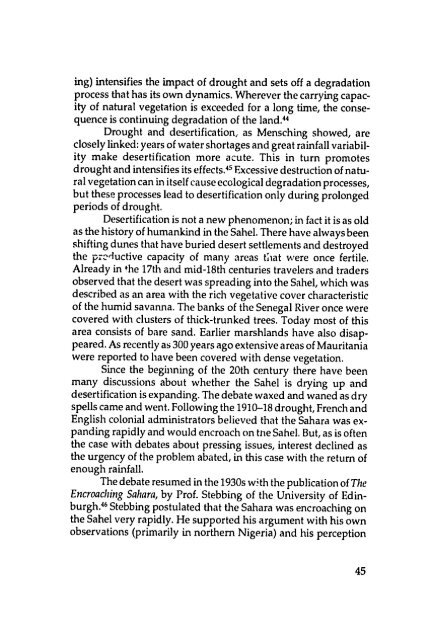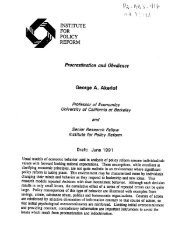Survival in the Sahel
Survival in the Sahel
Survival in the Sahel
You also want an ePaper? Increase the reach of your titles
YUMPU automatically turns print PDFs into web optimized ePapers that Google loves.
<strong>in</strong>g) <strong>in</strong>tensifies <strong>the</strong> impact of drought and sets off a degradation<br />
process that has its own dynamics. Wherever <strong>the</strong> carry<strong>in</strong>g capacity<br />
of natural vegetation is exceeded for a long time, <strong>the</strong> consequence<br />
is cont<strong>in</strong>u<strong>in</strong>g degradation of <strong>the</strong> land. 4<br />
Drought and desertification, as Mensch<strong>in</strong>g showed, are<br />
closely l<strong>in</strong>ked: years of water shortages and great ra<strong>in</strong>fall variability<br />
make desertification more acute. This <strong>in</strong> turn promotes<br />
drought and <strong>in</strong>tensifies its effects. 4 " Excessive destruction of natural<br />
vegetation can <strong>in</strong> itself cause ecological degradation processes,<br />
but <strong>the</strong>se processes lead to desertification only dur<strong>in</strong>g prolonged<br />
periods of drought.<br />
Desertification is not a new phenomenon; <strong>in</strong> fact it is as old<br />
as <strong>the</strong> history of humank<strong>in</strong>d <strong>in</strong> <strong>the</strong> <strong>Sahel</strong>. There have always been<br />
shift<strong>in</strong>g dunes that have buried desert settlements and destroyed<br />
<strong>the</strong> pr-'ductive capacity of many areas that were once fertile.<br />
Already <strong>in</strong> <strong>the</strong> 17th and mid-18th centuries travelers and traders<br />
observed that <strong>the</strong> desert was spread<strong>in</strong>g <strong>in</strong>to <strong>the</strong> <strong>Sahel</strong>, which was<br />
described as an area with <strong>the</strong> rich vegetative cover characteristic<br />
of <strong>the</strong> humid savanna. The banks of <strong>the</strong> Senegal River once were<br />
covered with clusters of thick-trunked trees. Today most of this<br />
area consists of bare sand. Earlier marshlands have also disappeared.<br />
As recently as 300 years ago extensive areas of Mauritania<br />
were reported to have been covered with dense vegetation.<br />
S<strong>in</strong>ce <strong>the</strong> beg<strong>in</strong>n<strong>in</strong>g of <strong>the</strong> 20th century <strong>the</strong>re have been<br />
many discussions about whe<strong>the</strong>r <strong>the</strong> <strong>Sahel</strong> is dry<strong>in</strong>g up and<br />
desertification is expand<strong>in</strong>g. The debate waxed and waned as dry<br />
spells came and went. Follow<strong>in</strong>g <strong>the</strong> 1910-18 drought, French and<br />
English colonial adm<strong>in</strong>istrators believed that <strong>the</strong> Sahara was expand<strong>in</strong>g<br />
rapidly and would encroach on tne <strong>Sahel</strong>. But, as is often<br />
<strong>the</strong> case with debates about press<strong>in</strong>g issues, <strong>in</strong>terest decl<strong>in</strong>ed as<br />
<strong>the</strong> urgency of <strong>the</strong> problem abated, <strong>in</strong> this case with <strong>the</strong> return of<br />
enough ra<strong>in</strong>fall.<br />
The debate resumed <strong>in</strong> <strong>the</strong> 1930s w; th <strong>the</strong> publication of The<br />
Encroach<strong>in</strong>gSahara, by Prof. Stebb<strong>in</strong>g of <strong>the</strong> University of Ed<strong>in</strong>burgh.<br />
46 Stebb<strong>in</strong>g postulated that <strong>the</strong> Sahara was encroach<strong>in</strong>g on<br />
<strong>the</strong> <strong>Sahel</strong> very rapidly. He supported his argument with his own<br />
observations (primarily <strong>in</strong> nor<strong>the</strong>rn Nigeria) and his perception<br />
45

















